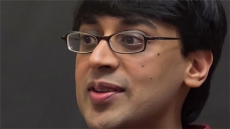When Jay Su got into cryptocurrency in October last year, he rejected the popular Bitcoin in favour of a lesser-known alternative, Litecoin.
Bitcoin was on the rise that month, gaining mainstream attention and with one unit at a high of more than US$200, while one litecoin was at a low of US$1.11.
But the underrated aspect of the second-most popular cryptocurrency was exactly what appealed to Su.
“It's lucky I did that because Litecoin did go up to $50 a coin," he said over the phone from Richmond, B.C.
"Even though the value has gone down to a single digit recently... there's definitely potential there. It's not going to go away."
Su, who started a Litecoin online currency exchange in March, is part of a growing group involved in minting cryptocurrencies other than Bitcoin.
There are two ways to obtain cryptocurrency: to buy them with cash, as in traditional currency, or to generate them for free through a process called "mining."
People who mine use programs to solve cryptographic puzzles — a process which also verifies the currency's transactions — and are rewarded with coins when the puzzles are solved.
The Litecoin mined by Su is one of hundreds of alternative currencies, dubbed "altcoins." They form less than 10 per cent of the cryptocurrency market, but their daily exchange volume is already valued in the millions.
Not only do some have more room for appreciation, Su said, they are also easier to produce than Bitcoin, whose popularity is making the process harder.
Anthony Di Iorio, executive director of the Bitcoin Alliance of Canada, said mining gets harder with more participants, so much so that generating Bitcoin is now impossible without expensive, specialized equipment.
"It's really like an arms race right now,” he said.
“It’s whoever can come up with the fastest machine — until those become obsolete and new technology replaces them." he said.
Di Iorio added that a lot of people use their old machines on other cryptocurrencies when that happens.
Su, who spent about $2,000 on a graphics-card-based Litecoin mining rig, did so at a time when such systems were already deemed too slow for Bitcoin.
According to a Bank of Canada working paper earlier this month, the popularity of the alternative currencies has risen.
The paper studied changes in exchange values of the currencies, which it says are a “good measure of changes in demand.”
Between October last year and February this year, Bitcoin’s value dropped against three currencies: Litecoin, Peercoin and Namecoin. The one with the highest increase, Peercoin, nearly tripled its value at the end of September.
The paper, however, attributed the rise of the coins to trader and user activity — not the mining community.
Yuri Takhteyev, a technology researcher affiliated with the University of Toronto, said currency derives power from those who put faith in it and use it — not the miners, whose numbers matter little.
He said the number of bitcoins released at a given time is constant, so fewer miners would still generate the same number of coins.
“People are not normally expected to get Bitcoin by mining. If you want to get some Canadian currency, you don’t go to print it,” he said.
“If I want to use Bitcoin today, I can just walk down to a Bitcoin ATM and put $20 in.”
Takhteyev said while alternative cryptocurrencies are gaining ground, Bitcoin has an advantage simply because it’s the first one and the best-known.
If a cryptocurrency will break the Bitcoin domination, he said, it’ll likely be something completely different from Bitcoin — something not yet available — as current alternatives are merely derivatives.
“If you look at Dogecoin versus Bitcoin — what’s the difference?” he said. “It has a dog as its logo. That’s the extent of the difference.”





